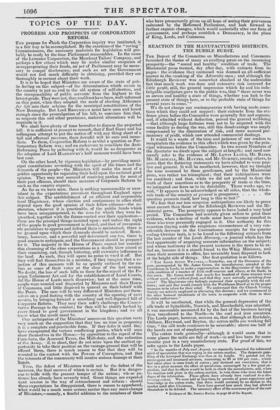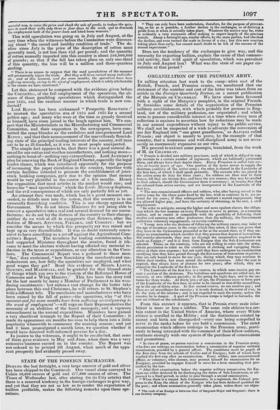REACTION IN THE MANUFACTURING DISTRICTS. THE BUBBLE BURST.
THE Report of the Committee on Manufactures and Commerce furnished the theme of' many an exulting paean on the inereasina- prosperity—the " sound and healthy " condition of trade. The Ministerial press teemed, day after day, with extracts from its pages : the evidence they contained was deemed an all-sufficient answer to the croaking of the Adversity-men ; and although the Edinburgh Reviewer was somewhat abashed at the undeniable fact that much work was done and extensive risk incurred for little profit, still, the general impression which he and his inde- fatigable coadjutors gave to the public was, that " there never was so secure and healthy a state of things, whether you look to the present state of things here, or to the probable state of things for several years to come. 4- We do not charge our contemporaries with having made asser- tions which they could not support : their extracts from the evi- dence given before the Committee were generally fair and copious; and, if admitted without deduction, proved the general welldoing —that although large fortunes were not to be acquired with the same facility as during the war, still this disadvantage was amply compensated by The diminution of risk, and more assured per- manency of profit, which now attended commercial dealings. It would be a waste of the time and patience of our readers to recapitulate the evidence to-this effect which was given by the prin- cipal witnesses before the Committee. In two recent Numbers of the Spectator we dwelt upon the subject at length; and need now merely refer to the evidence of Mr. LEWIS LLOYD, Mr. BATES, Mr. MARSHALL, Mr. HAYNES, and Mr. GURNEY, among others, to prove that the flattering statements we have alluded to were posi- tive and general. It will be recollected, however, that we thought the tone assumed by these gentlemen, and by the Ministerial press, was rather too triumphant ; that their anticipations were too confident ; and that, while we did not pretend to deny the truth of their assertions as to the prosperity of trade at the time, we intimated our fears as to its durability. Three weeks ago, we said, " It appears to be acknowledged on all sides, that the whole- sale trade of the country at present is prosperous . . . . the question presents itself, how long is this to last ?" We fear that our less sanguine anticipations are likely to prove more correct than those of the Edinburgh Reviewer and the Mi- nisterial press. The prosperity appears to have lasted a very brief period. The Committee had scarcely given orders to print their evidence, when a decline of trade must have become manifest to those who were personally engaged in it. Our authority for this assertion (laying aside the suspicious circumstance of a very con- siderable decrease in the Customhouse receipts for the quarter ending October last), is to be found in the following extracts from the last number of the Leeds Mercury,—a journal which has the best opportunity of acquiring accurate information on the subject; and whose testimony in the present instance is the more to be re- lied on, because it is a stanch friend to the Whig Ministers, and since their accession to office, has invariably been disposed to leek at the bright side of things. Our first quotation is as follows. " THE IRISH STUFF WEAVERS.—Yesterday, one of the Overseers of the poor, accompanied by Mr. James Green, the manufacturer, attended at the Courthouse in Leeds, to make a representation to the Magistrates of the deplo- rable condition of a number of Irish stuff-weavers and others, at the Bank, in this town. Mr. Green stated that nearly five hundred of those weavers were without work, and without food, and that they were actually perishing from want! The Magistrates very feelingly expressed their sympathy with the suf- ferers ; and said they would consult with the Workhouse Board as to the proper measures to be taken for their relief. We understand that the Church Visiting Society are actively employed in alleviating this distress; and we recommend to the other humane inhabitants of the town to cooperate with them in their laudable endeavours."
It will be recollected, that while the general depression of the silk trade at Spitalfields, Norwich, and Macclesfield, was admitted, it was reasonably accounted for by the fact of the business having been transferred to the North—to the coal and iron countries. The Leeds paper, however, assures us, that although at Rochdale, Oldham, Heywood, and Royton, the, cotton-mills are working full time, " the silk trade continues to be miserable; above one half of the hands are out of employment." The cotton trade generally—although it would seem that in some places the mills are full of work—is and has been for some months past in a very unsatisfactory state. For proof of this, we refer again to the Leeds paper.
" In the months of July and August, we repeatedly lamented the infatuated spirit of speculation that was raging in the cotton-market. The desperate gam- bling of the Liverpool Exchange was then at its height. We pointed out the extravagant and unnatural advance, amounting to 90 or 100 per cent., which had taken place in some kinds of cotton ; and declared our conviction, that it was in a great measure the effect of speculation, encouraged by a few great ca- pitalists, and that its effects would be both to check the manufacture, and, when the reaction took place in the cotton-market, to ruin those who were the latest dupes of the infatuation. These effects hare already been realized to a dis- tressing extent. We were told at that time, by persons of great experience and knowledge in the cotton trade, that there would certainly be no decline in the market until after Christmas. Facts have proved how much they had allowed theniselves to be deluded. The necessary effect of the enormous price of the raw * Evidence of Mr. JOSHUA BATES, in page 48 of the Report. material was, to raise the price and check the sale of goods, to induce the spin- fors to work their mills only three or four days in the week, and to diminish the employment both of the power-loom and band-loom weavers."
This wild speculation was going on in July and August, at the very time when the witnesses before the Committee were discours- ing about " the sound and healthy condition of trade." The de- cline since July in the price of the description of cotton most generally used, is not less than 4d. per pound; and the quantity of cotton annually imported into this country is about 280,000,000 of pounds ; so that if the fall has taken place on only one-third of this quantity, the loss will be a million and three-quarters sterling.
" There is no reason to suppose that the mad speculations of the summer will permanently, injure the trade. But they will have ruined many individu- als; and at this moment, and for some months, the operatives have been suffering severely, owing to the want of employment, which is solely attributable to the causes we have mentioned."
Let this statement be compared with the evidence given before the Committee, of the full employment of the operatives, the ab- sence of those gambling speculations which distinguished the year 1825, and the cautious manner in which trade is now con- ducted!
Lord RIPON has been nicknamed " Prosperity ROBINSON :" he mistook the speculative sera of 1824 and 1825 for a second golden age ; and many who were at the time as grossly deceived as himself, have since joined in the laugh against him. We sus- pect that the Ministerialists in the Manufacturing and Commercial Committee, and their supporters in the newspapers, have com- mitted the same blunder as the credulous and inexperienced Lord RIPON; and that their announcement of the marvellously flourish- ing state of the principal trading interests of the country, will turn out to be as ill-founded, as it was to most people unexpected.
The simple fact appears to be, that there was a good natural de- mand for our cotton and woollen manufactures, and nothing more— nothing to boast of—nothing very extraordinary. Lord ALTHORP'S plan for renewing the Bank of England Charter, especially the legal tender clause, which was introduced apparently for the purpose of increasing the paper circulation in the country, together with certain facilities intended to promote the establishment of joint- stock banking companies, gave rise to the opinion that money would be very plentiful in the course of a few months. Hence the supposition that most articles in the market would rise; and hence the "mad speculations" which the Leeds Mercury deplores, and the evil consequences of which are only partially felt as yet.
An attempt then was made, which has in a great measure sue- .ceeded, to delude men into the notion, that the country is in an unusually flourishing condition. This is our charge against the Government. We do not blame Ministers for not being able to convert a speculative into a real and natural demand for our manu- factures: we do not lay the distress of the country to their charge; neither do we wish at all to exaggerate that distress, after the fashion of Messrs. ATTWOOD, FIELDEN, and COBBETT : but we consider the means by which this prosperity cry was raised and kept up as very discreditable. It was no doubt extremely conve- nient to have something as a set-off against the Agricultural Com- mittee's Report. The members for trading constituencies, who had supported Ministers throughout the session, found it irk- some to meet the electors without having effected any material re- dintion in the taxes or expenditure, or any alteration in the Corn- laws. The Commercial Report was a godsend to these men. " See," they exclaimed, "how flourishing the merchants and ma- nufacturers are, how fully the operatives are employed, and what good wages they get! Read this evidence of Messrs. LLOYD, GURNEY, and MARSHALL, and be grateful for that blessed state of things which you owe to the wisdom of the Reformed House of Commons and a Whig Ministry." This has been the story told for the last month by many a Member of Parliament to his won- dering constituents : but unless a vast change for the better take place between this and Christmas, he will Aurn to St. Stephen's with a different tale. The merchants and manufacturers who have been ruined by the fall of prices—the operatives, who "at this moment and for some months have been suffering severely owing to the want of employment"—will urge on their Representatives the necessity of an abolition of the bread monopoly, and- a vigorous retrenchment in the annual expenditure. Ministers have gained a very shortlived triumph by the Report of their Committee : it made its appearance six months too soon to help them into a little popularity wherewith to commence the ensuing session; and yet had it been promulgated a month later, we question whether it would have deceived well-informed persons for a day.
In justice to the witnesses, it ought to be recollected, that some of them gave evidence in May and June, when there was a very extensive business carried on in the country. The Report was not ordered to be printed till August, when much of the apps. rent prosperity had evidently passed away.



















 Previous page
Previous page